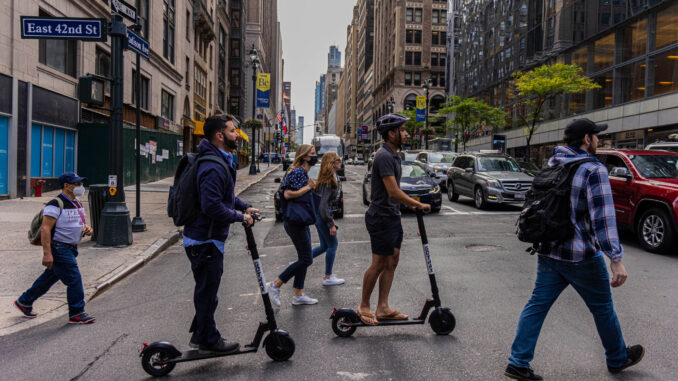
By Shlomie Katash
New York City has officially begun enforcing safety regulations on lithium-ion batteries found in electric bikes and scooters. The law, enacted on Sept. 16, is a response to the increasingly rampant and deadly fires that, in large part, were caused by malfunctions in the now-banned faulty batteries.
Lithium-ion batteries have become an increasingly popular energy source in recent years due to their efficiency, compact size, and powerful energy outputs. They have become especially ubiquitous in use in personal electric mobility devices, such as e-bikes and e-scooters. However, as the batteries have become more common, so too have cheap alternatives. Those that claim to be a suitable substitute for industry-regulated batteries have been shown to be susceptible to exploding from overcharging, according to the Fire Department of New York.
This year alone, there have been 14 deaths and 93 other injuries caused by lithium-ion battery fires, including one that injured five people in Kensington, Brooklyn on Sept. 24. The fires sparked by lithium-ion batteries are known to be quick and self-sustaining, making it difficult for victims to escape without an injury.
The new law, Local Law 39, was passed earlier this year and prohibits the sale or distribution of e-bikes, e-scooters, and lithium-ion batteries for those devices that fail to meet recognized industry safety standards. Devices and batteries will be inspected by New York City’s Department of Consumer and Worker Protection, and those that have not been shown to meet the standards could receive up to a $1,000 fine for each violating device.
The standards selected come from UL Standards & Engagement, one of the leading organizations in the safety standards industry. UL 2849 is the standard for e-bikes, UL 2272 is for e-scooters, and UL 2271 is for lithium-ion batteries. Each standard puts the electrical systems in their respective devices through rigorous tests to ensure that they are capable of reacting in a safe manner to numerous different environments and actions, including being dropped and overcharged. If a manufacturer sends in a sample of their device to UL and it passes the various tests, they officially become UL certified and need to pass testing annually.
Despite the high cost associated with putting a device through these tests, UL has noted an uptick in companies certifying their personal electric mobility devices since the law’s passing.
